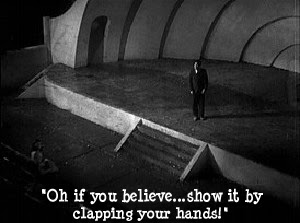 Two lovers are an unfinished symphony in the ruins of post-war Japan, mired in the emotional fallout of despair and suffering, struggling to see the world not as it is…but as it should be. Director Akira Kurosawa attempts to imbue his film with the robust humanity of Frank Capra, as Yuzo and Masako are nitrate reflections of George and Mary Bailey, but instead of showing us a lifetime Kurosawa shows us a day in the life.
Two lovers are an unfinished symphony in the ruins of post-war Japan, mired in the emotional fallout of despair and suffering, struggling to see the world not as it is…but as it should be. Director Akira Kurosawa attempts to imbue his film with the robust humanity of Frank Capra, as Yuzo and Masako are nitrate reflections of George and Mary Bailey, but instead of showing us a lifetime Kurosawa shows us a day in the life. The story is set on a Sunday afternoon, the weekly meeting for this poor couple, where the day begins well but grows gradually darker both in spirit and weather. The opening shot is of Yuzo staring at a discarded cigarette butt, the pain of indignity upon his face, which mirrors the knowledge that he has been reduced to grubbing for trash. But along comes Masako, full of vibrant energy and life-affirming beauty, to temporarily quell his quiet desperation. The camera follows them throughout the day as they struggle with only a few yen: Yuzo feeling less than a man because they have to use her money and Masako wearing the mask of cheerfulness. Together they play husband and wife in a prototype house that they will never afford, visit the zoo where the animals seem more content than they, get ripped off by scalpers at a Schubert concert, and then can’t afford a tiny meal at a local café. Leaving his coat behind, they walk through a dreary night and into the ruins of a courtyard, where they dream of opening their own café, treating customers with respect and dignity.
The story is set on a Sunday afternoon, the weekly meeting for this poor couple, where the day begins well but grows gradually darker both in spirit and weather. The opening shot is of Yuzo staring at a discarded cigarette butt, the pain of indignity upon his face, which mirrors the knowledge that he has been reduced to grubbing for trash. But along comes Masako, full of vibrant energy and life-affirming beauty, to temporarily quell his quiet desperation. The camera follows them throughout the day as they struggle with only a few yen: Yuzo feeling less than a man because they have to use her money and Masako wearing the mask of cheerfulness. Together they play husband and wife in a prototype house that they will never afford, visit the zoo where the animals seem more content than they, get ripped off by scalpers at a Schubert concert, and then can’t afford a tiny meal at a local café. Leaving his coat behind, they walk through a dreary night and into the ruins of a courtyard, where they dream of opening their own café, treating customers with respect and dignity. Kurosawa doesn’t hide the darker elements of their relationship, as Yuzo invites her back to his room and makes a sexual pass: it is obvious that she is still a virgin and their relationship has not yet been consummated. She runs tearfully from the room and Kurosawa holds the camera on Yuzo’s isolation for five minutes, as he listens to the rain drum its nervous rhythm upon the leaking tin roof. But Masako is the stronger of the two and returns…he doesn’t run after her! Wandering in the lower depths of despair, they meet a starving war orphan and Masako’s selfless sacrifice brings a tiny light of kindness to this child’s dirty face.
 Yuzo is a stark realist, knowing that dreams don’t fill an empty stomach, but Masako is his counterpoint, his hope, and his raison d’être. In the windswept night they find a deserted bandshell and she sits attentively while he vainly attempts to imagine an orchestra playing Schubert, but the only sound is the rustle of dead leaves and the soft murmur of cold wind. Here, Kurosawa breaks the narrative’s fourth wall and like Wendy in PETER PAN, Masako speaks directly to the audience. But she doesn’t ask for complicity, she begs and pleads for help, their very lives depending upon the audience clapping so Yuzo can hear the imaginary orchestra. This device contradicts the film’s morality in that strength must be found within and together, not by some outside force: though heartfelt, it falls on a completely flat note. Finally, the string section swells and they are happy once again, ready to face another Sunday together. Final Grade: (C)
Yuzo is a stark realist, knowing that dreams don’t fill an empty stomach, but Masako is his counterpoint, his hope, and his raison d’être. In the windswept night they find a deserted bandshell and she sits attentively while he vainly attempts to imagine an orchestra playing Schubert, but the only sound is the rustle of dead leaves and the soft murmur of cold wind. Here, Kurosawa breaks the narrative’s fourth wall and like Wendy in PETER PAN, Masako speaks directly to the audience. But she doesn’t ask for complicity, she begs and pleads for help, their very lives depending upon the audience clapping so Yuzo can hear the imaginary orchestra. This device contradicts the film’s morality in that strength must be found within and together, not by some outside force: though heartfelt, it falls on a completely flat note. Finally, the string section swells and they are happy once again, ready to face another Sunday together. Final Grade: (C)
